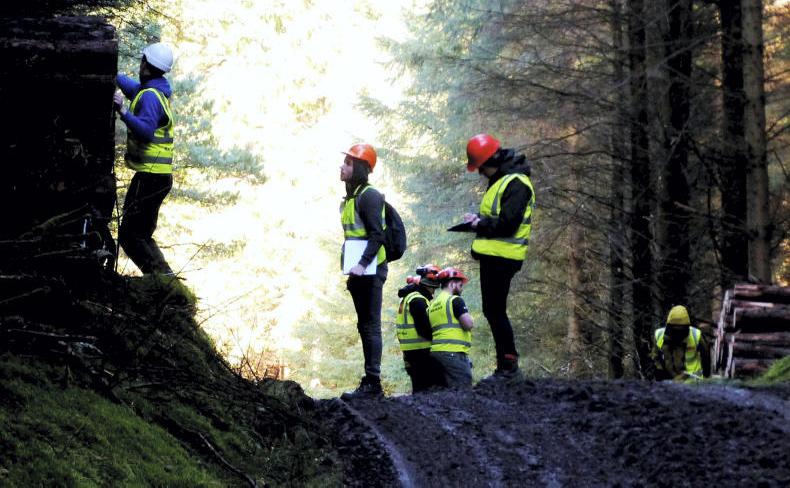Training and education of Irish foresters began in Ireland with the establishment of Avondale in 1904. The Forestry Department at the Royal College of Science, now University College Dublin (UCD), has provided a forestry degree programme since 1927. Today, Ireland is well served in forestry education and training by UCD, Waterford Institute of Technology (WIT) and Teagasc Ballyhaise College.
“UCD offers the only Further Education and Training Awards Council (FETAC) Level 8 Forestry degree programme in Ireland,” said Dr Áine Ní Dhubháin, associate professor.
“The first year of this four-year degree programme is spent getting a grounding in the basic science subjects and in second year, forestry-related subjects are introduced,” she explained.
“The third-year curriculum is devoted almost entirely to practical forestry subjects such as forest management and silviculture as well as GIS.”
During third year, students also undertake professional work experience for a period of 16 weeks. Some students take the opportunity to gain forestry experience abroad.
“In the final year, students study sustainable forest management, forest planning and inventory, but the majority of the year is spent on self-directed project work which involves preparing a forest management plan and conducting a research project,” maintained Dr Ní Dhubháin.
She pointed to the excellent opportunities for graduates to participate in research activity by undertaking post-graduate research, either at masters or PhD level. “UCD forestry graduates find employment in all areas of the forestry sector including forest management and consultancy, wood processing and renewable energy, education and research.” The entry requirements are a grade of H7/O6 in Irish, English, maths, one of the science subjects and two other recognised subjects. Further information here.
Education of professional foresters is in its twentieth year in WIT. The Bachelor of Science in Forestry degree course has grown in stature and has more than doubled its annual intake of students in recent years.
“Last year, 37 students commenced their forestry studies and are currently engaged in the first year of the three-year degree programme,” said Tom Kent, programme leader.
In 2005, a formal progression link was agreed between WIT and Ballyhaise College. Since then, over 50 Level 5 Certificate in Forestry and Level 6 Advanced Certificate students have availed of the opportunity to transfer from Ballyhaise to WIT.
A one-year, top-up Level 8 bachelor of science in land management in forestry was added in 2005. About half the graduates of the Level 7 BSc in forestry continue their studies to the Level 8 forestry degree at WIT. Students have also transferred to the Level 8 forestry degree programme in UCD, or have continued studies abroad.
Graduates have developed careers in all parts of the forestry sector both in Ireland and overseas. For further information, Google Forestry Waterford Institute of Technology.
Teagasc College Ballyhaise provides Level 5 and Level 6 forestry courses with opportunities to continue education at WIT. The Level 5 certificate in forestry course provides a sound understanding of the fundamental knowledge and the essential skills required for those involved in forestry operations, according to course lecturer Marianne Lyons.
“The course is aimed at those who are looking to expand or update their skills and training and to improve career prospects by obtaining a recognised forestry qualification,” she said. Many graduates now advance to higher education.
The course is full-time from September to May and includes an eight-week practical learning period.
“There is no minimum educational requirement for the course but applicants who have achieved a leaving certificate standard of education are likely to benefit most,” she said. All applicants will be interviewed and will need to demonstrate an interest in the subject. Applicants must be over 17 years and can apply online – Google Ballyhaise Level 5 forestry.
Classroom theory includes silviculture, forest safety and sustainable forestry, forest development, forest calculations and leadership. Practical skills include a range of forests-based operations from chainsaw maintenance and felling to pesticide application.
Students who successfully complete the course are awarded the QQI Level 5 certificate in forestry, which qualifies them to work in forestry operations. Alternatively, they may wish “to progress to the Level 6 advanced certificate in forestry or apply for advanced entry into year two of the degree programme at WIT,” said Marianne.
The Level 6 course runs from September to June and includes a 12-week practical learning period. Practical skills in the forest and classroom theory are spread out in three-week blocks to include forest establishment and management, business management and skills training.
The forestry course is celebrating its 30th anniversary this year. To mark the occasion, an open day will take place on Thursday 10 May to highlight career opportunities in forestry. For further information phone or email Ballyhaise (049-4338108 or Ballyhaise.college@teagasc.ie).
Native woodland established at Knockree by An Óige
Volunteers from the An Óige Conservation Group braved the wet and windy conditions recently to help establish a native woodland at Knockree, Co Wicklow. Comprising native 10,000 oak, alder, birch, Scots pine, rowan and cherry, the trees were planted in a 4.6ha site attached to An Óige’s Knockree Youth Hostel. The project is part funded by Forest Service native woodland scheme.
“The establishment of this new native woodland is a big step forward in our efforts to carry out the Knockree 26ha nature conservation management plan which has been adopted as a strategic objective of the youth hostelling assocciation,” said Philip Hayden, Head of the An Óige Conservation Group.
“Future projects will involve bracken control, surveys, hedgerow restoration and developing the educational potential of the site.”
